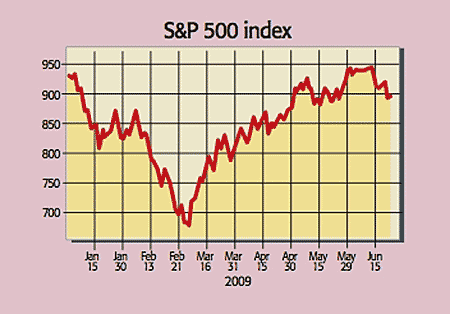
Investors have driven global stocks up sharply since March, betting that the global economy is turning the corner and could rebound rapidly. But now they’re not so sure.
Last week major markets slid and on Monday America’s S&P 500 tumbled 3%, its worst daily drop in two months. The FTSE 100 has fallen by around 5% since 12 June. Emerging markets have slid by 10%, with Russia losing over 20%, becoming the first global market to slide into official bear territory.
The World Bank added to jitters on Monday by revising down its 2009 global forecast to 2.9%, down from 1.7% just three months ago.
What the commentators said
Investors seeing “green shoots everywhere” earlier this month began to pencil in a rise in US interest rates by the end of the year, said John Authers in the FT. That now looks to have been the moment when the market was forced to ask itself whether a recovery really was imminent.
Investors soon noticed that there were plenty of “yellow weeds” around, as Nouriel Roubini of New York University put it.
For instance, the eurozone posted record job losses in the first quarter; the decline in US industrial production has accelerated, while earnings from US bellwether FedEx also disappointed. The European Central Bank’s president Jean Trichet said that “we are still in the downturn phase”. Investors have started to realise that “the recovery is not going to be V-shaped”, said Alvin Liew of Standard Chartered.
It’s hard to make a case for a recovery when debt-soaked, savings-short consumers rattled by falling house prices and unemployment are concentrating on deleveraging.
Meanwhile, banks are wary of mounting defaults as the downturn takes its toll and many are still undercapitalised, so the “credit crunch will not ease quickly”, said Roubini. Take Britain. April’s lending to businesses was the worst since June 2000, said Ian Campbell on Breakingviews.
With lending so constrained, the economy cannot recover, said Campbell. History shows that after recessions induced by banking crises, recovery takes several years.
What next?
Markets calmed down on Tuesday and Wednesday. But it’s interesting to note that US company directors – who are best placed to gauge their firms’ prospects – are selling their shares at the fastest pace since the credit crunch began.
So “the smartest players in the US stockmarket… are not betting their own money on an economic recovery”, as Charles Biderman of TrimTrabs put it. And their faith in the rally continuing, said Anuj Gangahar in the FT, is clearly “flimsy”.